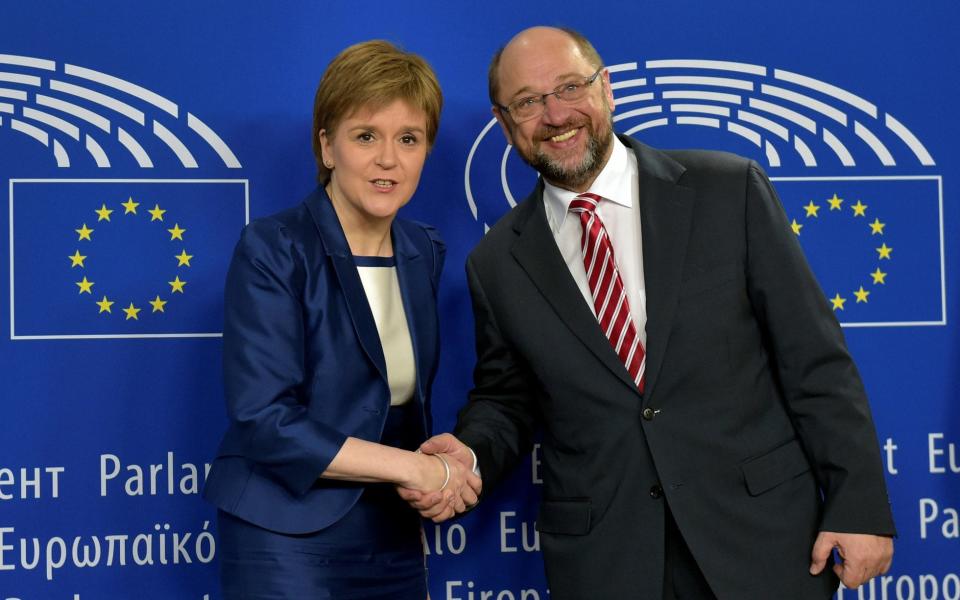Martin Schulz profile: Left-wing europhile who wants 'hardest Brexit possible' and hopes to topple Angela Merkel

Martin Schulz, who has emerged as the most serious challenger Angela Merkel has faced in more than a decade in power, is best known in Britain as one of Brexit’s harshest critics.
In his former role as president of the European parliament, Mr Schulz accused David Cameron of “taking a whole continent hostage for a party’s internal struggle” with last year’s referendum, and warned Brexit could result in the “mutual humiliation” of Britain and the EU.
He has threatened “the hardest Brexit possible” if MEPs were excluded from talks.
And in March he was unanimously elected as the leader of the left-leaning Social Democrats, confirming his status as the main opponent to Angela Merkel at the upcoming federal elections.
Now, after a tumultuous week in German politics, he could be leader of Europe’s most powerful country within eight months.
The 61-year-old Mr Schulz is almost certain to lead the Social Democrats (SPD) into September’s elections after Sigmar Gabriel, the current party leader, unexpectedly stepped down.
That decision has turned German politics on its head. One snap opinion poll in the wake of the announcement put Mr Schulz and Mrs Merkel neck and neck, on 41 per cent each.
It is a state of affairs that could see Theresa May pin her hopes on Mrs Merkel clinging on to power, rather than face Brexit’s arch-critic across the negotiating table.

It was all supposed to turn out differently for Mr Schulz. As a young man, he was on the brink of a professional football career when a serious knee injury destroyed his dreams.
He dropped out of school without taking his final exams, and sank into alcoholism and depression.
But he dragged himself back from the brink and reinvented himself, first as a bookseller, then as a local politician in his home town of Würselen, near Aachen in the far west of Germany.
Since 1980, he has been teetotal. Six years later, at the age of 31, he became the youngest mayor in North Rhine-Westphalia.
But it was via the unlikely route of the European parliament that Mr Schulz rose to real prominence.
He was elected an MEP in 1994, and found he had the networking and alliance building skills to rise above the hubbub of Brussels and propel himself to the top.
He was helped on his way by a public spat with Silvio Berlusconi. Mr Schulz dared to suggest that the then Italian prime minister might face a conflict of interests over his extensive media empire.

A furoious Mr Berlusconi told the upstart MEP he should audition for a film role as a concentration camp leader. There was uproar, but the incident made Mr Schulz a househole name in Germany.
In 2012 he became president of the European parliament, and became its fiercest champion, demanding more influence on EU decision-making.
Bat at the end of last year he abruptly decided to turn his back on Brussels and return to Germany for a belated career in national politics.
After the events of this week, that appears to have been a master-stroke. Mr Gabriel had been vacillating over whether to lead his party into this year’s elections against Mrs Merkel. On Tuesday he decided to throw the towel in, and recommended Mr Schulz as his successor.
He still faces an uphill struggle if he is to take on Mrs Merkel and win. The shock poll that found them neck-and-neck was something of an outlier, and a rival poll this week found Mr Schulz well behind, on 25.5 per cent to Mrs Merkel’s 40.7 per cent.
Those surveys are somewhat misleading anyway. They asked how people would vote if there was a direct election for chancellor. But Germany has a parliamentary system, not a presidential one, and to take power Mr Schulz will have to persude voters to back his party.
A poll of party support released on Friday found Mrs Merkel’s Christian Democrats (CDU) still well in front, on 36 per cent, ahead of Mr Schulz’s SPD on 24 per cent. The far-Right Alternative for Germany (AfD) are in third place on 11 per cent.
Mr Schulz’s supporters say he is well placed to turn things around. Unlike Mr Gabriel, who took the SPD into coalition with Mrs Merkel and has been her vice-chancellor for four years, he is untainted by government and can criticise her record.
But critics say his outsider status has a downside, because he has never been in German national politics before and has no experience and no allies.
Mr Schulz has rejected that, pointing out that as president of the European parliament he has plenty of experience of dealing with Mrs Merkel.
“I’ve worked with Mrs Merkel for longer than anyone else oustide her party,” he said this week. “I’ve been able to study her. I know her.”
Under Germany’s proportional representation system, if he is to have any chance at toppling Mrs Merkel he will have to forge an alternative coalition of his own. At the moment his most likely option is a three-way alliance with the Greens and the Left Party, which would drag Germany siginficantly to the left.
As for what his own policies would be, Mr Schulz said this week he would be a champion of “working people”, and vowed to take the fight to populists. The SPD, he said, would be a “bulwark against the enemies of democracy”.
As for Brexit negotiations, he made his priorities clear: “With me there will be no Europe bashing”.


